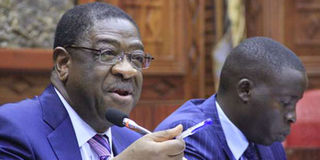Great care must be taken in the drafting of changes to poll laws

Senate Legal and Human Rights Committee Chair Amos Wako at County Hall on December 29, 2016 during a public hearing on the disputed electoral laws. PHOTO | DIANA NGILA | NATION MEDIA GROUP
What you need to know:
- The selection of commissioners to the Independent Electoral and Boundaries Commission (IEBC) should be above board.
- To qualify an entire clause in the manner that it has been drafted creates room for election irregularities.
Elections must not only be credible but must be seen to be so.
History has taught us that in Kenya, elections must be perceived to be credible to avoid civil unrest, as was the case in 2007/2008.
Part of the reason the Samuel Kivuitu-led Election Commission of Kenya had a semblance of credibility in the 1997 and 2002 elections, and the 2005 constitutional referendum, was the fact that the selection of the commissioners was a product of the Inter-Parties Parliamentary Group (IPPG) reform package.
The package provided for joint appointment of the commissioners through nomination by parliamentary parties.
Previously, the president had the power to unilaterally appoint commissioners.
However, in January, 2007, then president Mwai Kibaki ignored calls for an IPPG-like deal and instead unilaterally appointed nine commissioners to replace those whose terms had expired.
When the 2007 elections were held and Kibaki was declared winner, the results were hotly contested and political fault lines degenerated into violence in many parts of the country.
To prevent a repeat of this, the selection of commissioners to the Independent Electoral and Boundaries Commission (IEBC) should be above board.
In this new dispensation, selection panels should honour their oath of service and deliver commissioners who are worthy of the Kenyan people.
SHUTTING OUT TECHNOLOGY
Kenya has come a long way, in that, we have promulgated a new and progressive constitution that lays emphasis on accountability, transparency, human rights, public participation, and free expression.
However, underlying issues such as historical injustices have been swept under the carpet despite the findings and recommendations of the Truth Justice and Reconciliation Commission.
Additionally, victims of the 2007 atrocities have yet to be truly compensated and only two perpetrators of the violence have been prosecuted.
This state of affairs only serves to embolden those who want to use force, violence, and intimidation to achieve their political ends, partly because history has shown that such crimes are never punished.
As the debate rages on whether or not to amend our election laws to have a complementary voter register and results transmission system, any resultant law must subject the register to public audit, verification, and inspection.
As it stands, the amendments place the maintenance of the register exclusively at the discretion of the commission.
Additionally, the proposed amendments are unclear on whether the mechanism is purely a manual complement of the main register.
It is also not clear at what point the commission will abandon the electronic mechanism that is provided for in law.
This is hugely discretionary power whose adoption is fundamental as it alters the entire electoral process.
It is worth noting that the proposed amendment is drafted in an inherently open-textured manner.
It silently repeals section 44 of the Act which provides for the use of technology.
NO ISSUE
If the progenitors of the amendment have a point in the manner justified, the proper drafting methodology would have entailed qualifying the requirement of voter identification and results transmission in the same text by inserting an additional sub-clause in section 44 of the Act and specifying the instances where departure from the general rule is permitted.
To qualify an entire clause in the manner that it has been drafted creates room for election irregularities.
Can this major gap be cured by regulations?
In my view, the matter in dispute is a substantive issue in the electoral process.
Parliament should as much as possible strive to capture the major aspects in the principal legislation.
Only secondary legislative freebies should be left for regulations.
Strictly speaking there appears to be no problem with section 44 as it exists in the present law.
In my interpretation, IEBC can specify procurement requirements that allow the setting up of voter identification and results transmission systems that not only provide for a secure, simple, and verifiable voting process but also contain adequate backups in electronic and partly manual format provided the manual backup is, technologically speaking, a derivative of the electronic version of the system and the two are practically interlinked.
Tender specifications crafted in this manner will be within the provisions of section 44 of the Act and will render the problematic section 44A largely otiose.
Mr Kiprono is a senior programmes officer at Article 19 - Eastern Africa. [email protected]. @kipdemas





